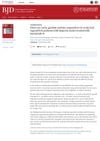 June 2024 in “Dermatology and Therapy”
June 2024 in “Dermatology and Therapy” Baricitinib improves quality of life and reduces anxiety and depression in severe alopecia areata patients with hair regrowth.
 September 2023 in “British Journal of Dermatology”
September 2023 in “British Journal of Dermatology” Hair regrowth from severe alopecia areata treatment with baricitinib can vary, with faster results in those with shorter hair loss duration.
 September 2023 in “PubMed”
September 2023 in “PubMed” Baricitinib is a relatively safe and effective treatment for severe alopecia areata.
 1 citations,
June 2023 in “American Journal of Clinical Dermatology”
1 citations,
June 2023 in “American Journal of Clinical Dermatology” Baricitinib helps regrow hair in severe alopecia areata but has side effects like infections and headaches.
 August 2024 in “JAMA Dermatology”
August 2024 in “JAMA Dermatology” Continuous baricitinib is needed to keep hair regrowth in severe alopecia areata.
 January 2025 in “Balkan Medical Journal”
January 2025 in “Balkan Medical Journal” Baricitinib helps regrow hair in severe alopecia areata and is safe, but more research is needed.

Baricitinib quickly improved severe alopecia areata, with almost total hair regrowth in three months.
 20 citations,
March 2023 in “American Journal of Clinical Dermatology”
20 citations,
March 2023 in “American Journal of Clinical Dermatology” Baricitinib improved severe hair loss in adults over 52 weeks and was safe to use.
 6 citations,
May 2023 in “Drugs”
6 citations,
May 2023 in “Drugs” Baricitinib helps regrow hair in adults with severe alopecia better than a placebo and is approved for treatment, but long-term effects are still unknown.
 4 citations,
November 2023 in “Frontiers in immunology”
4 citations,
November 2023 in “Frontiers in immunology” New treatments targeting T-cell pathways are needed for better alopecia areata management.
 14 citations,
January 2020 in “Mediterranean Journal of Rheumatology”
14 citations,
January 2020 in “Mediterranean Journal of Rheumatology” New JAK inhibitor drugs show promise for treating skin diseases but need more research on safety and effectiveness.
 1 citations,
September 2023 in “Dermatology and Therapy”
1 citations,
September 2023 in “Dermatology and Therapy” Baricitinib helps improve hair growth in severe alopecia, with better results in less severe cases and higher doses working faster.
 November 2023 in “British Journal of Dermatology”
November 2023 in “British Journal of Dermatology” Different people with severe hair loss respond to baricitinib treatment at different times, with some showing improvement early, some gradually, and others later.
 June 2023 in “British Journal of Dermatology”
June 2023 in “British Journal of Dermatology” Baricitinib was effective in treating severe and very severe alopecia areata after 52 weeks.
 November 2023 in “Dermatology and Therapy”
November 2023 in “Dermatology and Therapy” Baricitinib treatment helps regrow eyebrow, eyelash, and scalp hair in severe alopecia areata, improving patients' emotional well-being and quality of life.
 6 citations,
February 2023 in “Advances in Therapy”
6 citations,
February 2023 in “Advances in Therapy” Baricitinib, a drug for rheumatoid arthritis, atopic dermatitis, and alopecia areata, is generally safe with low risk of major side effects, even in patients with risk factors. It's also effective in promoting hair regrowth in alopecia areata patients.
March 2025 in “Journal of Education Health and Sport” Alopecia areata causes hair loss due to immune issues, and while new treatments show promise, no universally effective solution exists yet.
 August 2023 in “International journal of research in dermatology”
August 2023 in “International journal of research in dermatology” Janus kinase inhibitors are effective and generally safe for treating hair loss in adults with alopecia areata.
 October 2023 in “Frontiers in medicine”
October 2023 in “Frontiers in medicine” Targeted immunotherapy could be a promising new treatment for hair regrowth.
 September 2023 in “Dermatology and Therapy”
September 2023 in “Dermatology and Therapy” Baricitinib effectively regrows hair in most people with severe alopecia, especially those with patchy hair loss, but hair may fall out again if treatment stops.
 August 2024 in “Frontiers in Public Health”
August 2024 in “Frontiers in Public Health” Alopecia Areata severely impacts mental health, causing anxiety and depression, affecting quality of life.
 September 2023 in “JAAD case reports”
September 2023 in “JAAD case reports” A man developed oral hairy leukoplakia while on baricitinib, a medication for alopecia and arthritis, and doctors should watch for such side effects.

Tofacitinib may effectively treat hair loss and improve symptoms in autoimmune conditions like alopecia areata and Sjögren's syndrome, but long-term treatment might be necessary.
1 citations,
December 2023 in “Molecules/Molecules online/Molecules annual” JAK inhibitors show promise for treating various skin diseases.
 1 citations,
January 2023 in “Przegląd Dermatologiczny”
1 citations,
January 2023 in “Przegląd Dermatologiczny” The Polish Society of Dermatology recommends treatments for alopecia areata that vary by severity, including topical and systemic medications, with long-term maintenance important for management.
 January 2025 in “Journal of Cutaneous Immunology and Allergy”
January 2025 in “Journal of Cutaneous Immunology and Allergy” Baricitinib is effective for treating severe alopecia areata in Japanese patients, but long-term safety needs more study.
 25 citations,
November 2022 in “British journal of dermatology/British journal of dermatology, Supplement”
25 citations,
November 2022 in “British journal of dermatology/British journal of dermatology, Supplement” Baricitinib for severe alopecia areata is generally safe, with common side effects like infections and acne, and low rates of serious complications.
4 citations,
June 2023 in “Frontiers in immunology” JAK inhibitors help hair regrowth in alopecia areata but have a high risk of side effects.
 January 2025 in “Skin Health and Disease”
January 2025 in “Skin Health and Disease” Baricitinib may effectively treat both alopecia areata and immune thrombocytopenia.
 1 citations,
October 2023 in “Dermatology and therapy”
1 citations,
October 2023 in “Dermatology and therapy” Some treatments for severe hair loss work but often have side effects, with baricitinib showing the most promise.


























